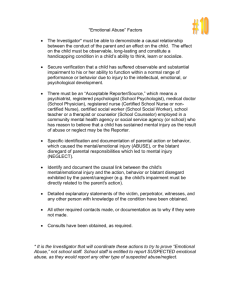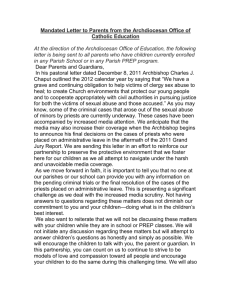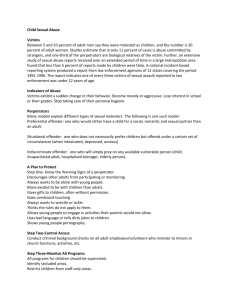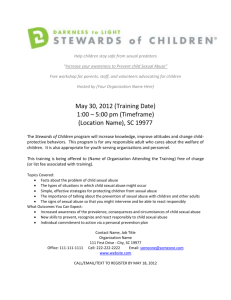CES Safguarding Children 2015
advertisement
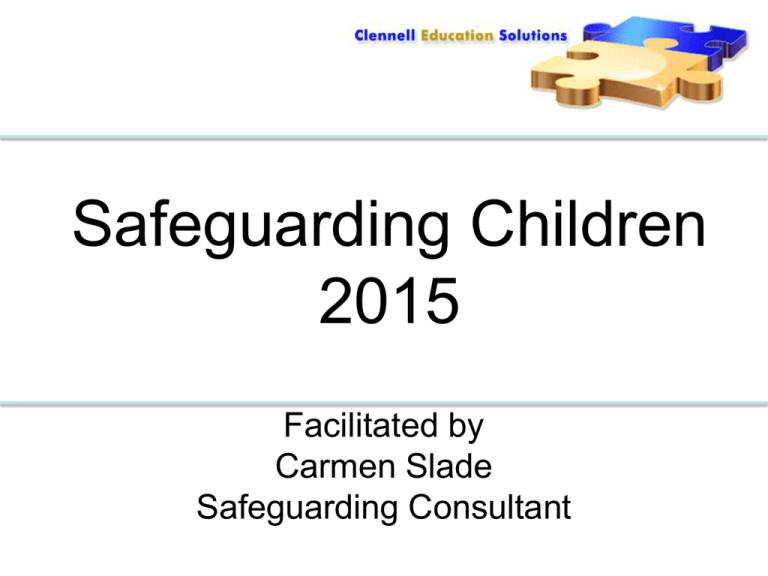
Safeguarding Children 2015 Facilitated by Carmen Slade Safeguarding Consultant Course Contents • Key Findings from Serious Case Review • Record Keeping • Child Sexual Exploitation • Female Genital Mutilation • Radicalisation • Protecting Yourself PC Senior House Officer Sergeant A&E Senior House Officer Paediatric Registrar Sergeant Nurse 1 Ward Sister Brent Police Consultant Paediatrician NSPCC Haringey housing Hospital 1 Nurse 4 Friend Distant Relative Brent Housing VICTORIA Psychology Senior use Officer Nurse 4 Nurse 2 Nurse 5 Dermatology Consultant Paediatrician Consultant Paediatrician Practice Nurse Enfield Hospital Social Worker Senior Nurse GP 1 Community Health Visitor Nurse 6 Nurse 1 Detective Inspector Team Manager Brent Social Services Enfield Social Services Ambulance Social Worker 1 Immigration Hospital 2 Registrar 3 Social Worker Senior Practitioner Nurse 3 Paediatric Registrar Sergeant Haringey Police Haringey Social Services Taxi Driver GP 2 French speaking nurse PC Nurse 2 Church 2 Child Minder A&E Nurse Nurse 3 Ealing Housing Church 1 Sergeant Social Worker 6 Ealing Social Services Social Worker 2 Registrar 2 A&E Casualty Officer Registrar 1 Social Worker 5 Social Worker 4 Social Worker 3 What does Safeguarding in Schools mean to you? Neglect Emotional Abuse Bullying, including Online and prejudice based bullying Child Sexual Exploitation Racist, disability and homophobic or transphobic Gender based violence Violence against girls Domestic Violence Substance Misuse Forced Marriage Gang activity and Youth Violence Sexual Abuse Physical Abuse Radicalisation Poor Parenting babies/younger children Fabricated or induced illness Female Genital Mutilation Teenage relationship abuse Impact of Technology on sexual behaviour sexting Children with Additional Needs Factors can increase the risk of abuse due to: • Increased stress on parents • Lack of support available • Issues related to the impairment • No. of carers involved • Level of care needed – intimate care • • • • Behaviour issues Personal safety skills Communication Vulnerable re. sex and relationships • Increased risk of bullying • Signs & symptoms unnoticed due to impairment Questionable Situations 4 Very Concerned David has arrived at school with a black eye Anthony is lethargic, appears withdrawn and tearful 3 Concerned Nathan is caught stealing food from packed lunch boxes Ian can’t do PE as he has a fractured arm Ewan says the police came when his mum and dad were fighting Lewis is loosing weight. Mum says he is having tests at hospital 2 Uncomfortable 1 Not Concerned Summary: Daniel Pelka Recording difficulties: •Basic info was not recorded •Delays in receiving information •Insufficient time to record •Gaps in information •Records not accessible •No expectation to record, centile, body map •Inconsistency in recording •Information was not in 1 place •Lack of training •Lack of clarity of role •Language used ‘plausible’ ‘safe and well’ •Ineffective Systems, not talking to one another • • • • • • • • • • . • • Paper v electronic systems Transition ‘file was in a box’ Staff changes Poor quality assessments Lacking in detail Failure to bring all information together Siblings, parent files not linked Recurrent injuries not recorded Actions not recorded No recognition of the significance of information held No date stamped on records when received Poor supervision / Management oversight What are records? Records are any documents generated, received and filed which include: • • • • • • • • • • Registers Incident Slips Photographs Consent forms Medication records Correspondence risk assessments Memos CAF E-mails • • • • • • • • • • • Texts News clippings Diaries Calling cards Child drawings Agendas Letters Contact logs Flyers Reports Minutes Records are a valuable resource (current or historical) because of the information they contain and information has most value when it is accurate, up to date and accessible when it is needed. Possible Signs of Sexual Abuse • Chronic throat infections and sexually transmitted diseases • Eating disorders. • Self-harm, attempted suicide, frequently running away • Unexplained pregnancy • Fear of undressing for sport or during hot weather • Phobias or panic attacks If it’s not recorded there’s no evidence of what you’ve done! Still Concerned? In the unlikely situation you feel that the DP is not acting appropriately with your concerns, you must do one of the following: • • • • Speak with the Headteacher Speak with the Chair of Governors Make a referral to Social Care Contact the Police Questionable Situations What are the four categories of abuse? Physical abuse Emotional abuse Sexual abuse Neglect Physical abuse Possible Signs of Physical Abuse • Unexplained injuries or burns, particularly if they are recurrent • Improbable excuses given to explain injuries • Refusal to discuss injuries • Untreated injuries • Admission of punishment which appears excessive • Fear of parents being contacted Possible Signs of Physical Abuse • Bald patches • Withdrawal from physical contact • Arms and legs kept covered in hot weather • Fear of returning home • Self destructive tendencies • Aggression towards others • Running away Emotional abuse Possible Signs of Emotional Abuse • Physical, mental and emotional development delay. • Admission of punishment which appears excessive. • Over-reaction to mistakes. • Continual self disapproval • Sudden speech disorders. • Fear of new situations. • Inappropriate emotional response. Possible Signs of Emotional Abuse • Behaviour such as rocking, hair twisting, thumb sucking. • Self-harm. • Fear of parents being contacted. • Extremes of passivity or aggression. • Drug/solvent abuse. • Running away. • Compulsive stealing, scavenging. Sexual abuse Possible Signs of Sexual Abuse • Sudden changes in behaviour or educational performance • Displays of affection in a sexual way • Tendency to cling or need constant reassurance • Tendency to cry easily • Regression to younger behaviour, e.g. thumb sucking, playing with discarded toys, “baby” behaviour • Complaints of genital itching or pain Possible Signs of Sexual Abuse • Distrust of a familiar adult, or anxiety about being left with a relative, baby sitter, lodger • Unexplained gifts or money • Depression or withdrawal • Apparent secrecy • Wetting or soiling day or night - after being dry for some time • Sleep disturbance or nightmares Possible Signs of Sexual Abuse • Chronic throat infections and sexually transmitted diseases • Eating disorders. • Self-harm, attempted suicide, frequently running away • Unexplained pregnancy • Fear of undressing for sport or during hot weather • Phobias or panic attacks Neglect Possible Signs of Neglect • Constant hunger • Poor personal hygiene/’smelly’/dental decay • Constant tiredness • Poor state of clothing/inappropriate clothing • Emaciation (abnormally thin) • Frequent lateness to school • Absence from school • Untreated medical/speech/hearing problems • Lack of appropriate boundaries • Lack of supervision/safety Possible Signs of Neglect • Destructive tendencies • Low self-esteem • Neurotic behaviour • No social relationships • Running away • Compulsive stealing or scavenging Child Sexual Exploitation Higher Risk of being exploited if: • are homeless • have feelings of low selfesteem • have had a recent bereavement or loss • are in care • are a young carer Absences from school Unexplained marks, cigarette burns Dressing in sexualised way Going missing / late home Unexplained Gifts/money Signs Of Exploitation Sexting / sending images Over familiar Sexualised with strangers behaviours Disruptive behaviour Sexual Transmitted Infections Changes in mood Female Genital Mutilation • Religion is NOT a basis for FGM • Cultural identity – A tribal initiation into adulthood • Gender Identity – Moving from girl to woman – enhancing femininity • Sexual control – believed to reduce the woman’s desire for sex and therefore the possibility of sex outside marriage • Hygiene/cleanliness – unmutilated women are regarded as unclean and not allowed to handle food or water Who is at risk? • 2 million girls around the world every year are mutilated • Mainly African and Middle Eastern countries and alarmingly now in the immigrant population of Europe, America and Australia • It is estimated that as many as 20,000 girls are at risk of FGM within the UK every year • Any girl is at risk – usually between 4-14 Communities at Risk: • • • • • • • Djibouti Somalia Sierra Leone Ethiopia Sudan Guinea In Middle East – Egypt How FGM is carried out? • Varies from community to community but generally by an elder woman in the community using non-sterile, blunt instruments without anaesthetic • UK girls are taken on “holiday” to become a woman, it is seen as a celebration • Communities in the UK are believed to have their own practitioners here • Some doctors will do this under anaesthetic Female Genital Mutilation Act 2003 The Law: • Offence to commit FGM • Offence to aid, abet, counsel or procure a girl to commit FGM • Offence for someone in the UK to aid, abet, counsel or procure FGM outside of UK that is carried out by a person who isn’t a UK national or resident • Any act done outside UK by UK National or resident What Next? • You should discuss any concerns with the Designated Person • You must consider making a referral to the Local Authority Children’s Social Care or police if urgent • Multi agency pathway currently being developed in Newcastle Radicalisation May possess Extremist related literature Rejection from family or peers Social Media Extremist Influences Poverty disadvantage social exclusion Low self esteem Global or National Trauma An event or series of traumatic events Criminality Identify Confusion Pressure from Peers associated With extremism Recent Religious Conversation Community Tension May have a new group of friends Questioning Faith Victim of race or religious hate crime Personal Trauma Family Conflict over political views Lifestyle choice Religious views Changes in behaviour Appearance as a result of new influences Justifies extremist actions Guidance for Safe Working Practice Safeguarding Staff Rules for Teachers — 1915 1. You will not marry during the term of your contract. 2. You are not to keep company with men. 3. You must be home between the hours of 8 PM and 6 AM unless at a school function. 4. You may not loiter downtown in any of the ice cream stores. 5. You may not travel beyond the city limits unless you have permission of the chairman of the chairman of the school board. 6. You may not ride in carriages or automobiles with any man except your father or brother. 7. You may not smoke cigarettes. 8. You may not dress in bright colours. 9. You may under no circumstances dye your hair. 10. You must wear at least 2 petticoats. 11. Your dresses may not be any shorter than 2 inches above the ankles. 12. To keep the classroom neat and clean you must sweep the floor once a day, scrub the floor with hot soapy water once a week, clean the blackboards once a day and start the fire at 7 AM to have the school warm by 8 AM when the scholars arrive. (New Hampshire Historical Society) Activity 1 Write a list of rules you currently follow to protect yourself at work. Dangers of social network Recent incidents in Schools Male teacher supporting a group of children and uses FACEBOOK as way to communicate with them. When course work is complete the following conversation took place ------- Girl: Thanks for all your support , you deserve drink lol xxx Teacher: Defo , you do as well!! in town tomorrow might bump into you (LOL) take care and well done x Staff talking about a Deputy Teacher: can’t believe she has given me year 5 !!! Support worker: What a BITCH !!!! Classroom assistant: since Head gone power had gone to the head. Teacher: clueless and power mad no wonder her hubby left lol Staff talking about a colleague Staff talking about children Female teacher on a Sunday posts on her FACEBOOK: Social Networking Safety • Professional tone when on social networking • Official channels when communicating with students/families • Terminology, no kisses, personal information • Privacy Setting • Accepting friends, firmly decline students, present and past, inform parents of the correct ways to discuss their child. • No comments relating to work, students etc. • Settings prohibit others from tagging you • If new to profession – carry out an audit, • Be aware, potential employers could view your profile • Password protect • Pass on any concerns, whistle blow Religious Education Teacher Encouraged Students To "Sleep Around“ 23rd January 2013 As an RE teacher it was her job to enlighten pupils about Christian values and the beliefs of other religions. Instead, Catherine Reynolds encouraged her class to have lots of sex and "sleep around" before marriage. In expletive-ridden lessons, she told pupils to "stop bloody talking", "sit on your a***’ and warned them: "If you don’t want to learn RE, you can p*** off". An investigation into her behaviour also found she posted offensive comments on her Facebook page. Following a parents evening she wrote: "That was the most f****** horrendous evening of my life", and branded parents "retarded". Reynolds made numerous references to "sex from a personal perspective" and told one pupil "not to get married because then you can’t sleep around“ and that "you should have sex all the time". In one lesson, she recounted a visit to Amsterdam in which she saw a sex show involving a horse and a woman and revealed she had been for a naked massage. She used inappropriate language on a regular basis, the report found, including a string of swear words used to describe various people. One pupil was apparently told to "F*** off". Reynolds, who is married with a one-yearold daughter, told her class of taking a morning-after pill and of having a relationship with an older man. She also showed pupils the tattoos on her lower back and her thigh and played them "inappropriate videos". Support and Guidance for School Staff • • • • • • • Union Representation Record Keeping Pass it on Whistle Blowing Policy Always be aware of your actions Do not put yourself in a vulnerable situation If in doubt speak to a HR representative Do not become the next headline!


